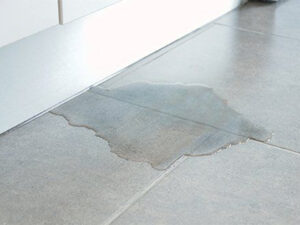How Common Are Slab Leaks and What You Should Immediately Do
 As a homeowner, you have to ensure that every aspect of your property is safe and free of damage. Unfortunately, plumbing issues like slab leaks can cause significant damage to your home, resulting in expensive repairs, a weakened foundation, and other issues. If you’re wondering, “how common are slab leaks?” you’re not alone.
As a homeowner, you have to ensure that every aspect of your property is safe and free of damage. Unfortunately, plumbing issues like slab leaks can cause significant damage to your home, resulting in expensive repairs, a weakened foundation, and other issues. If you’re wondering, “how common are slab leaks?” you’re not alone.
Plumbing in Cherry Hill by Davis Home Services is the best way to keep your home free of water damage. Here, our talented contractors explain everything you should know about slab leaks and what you should immediately do if you suspect you have one.
What Is a Slab Leak?
A slab leak may sound like a construction issue, but it is a plumbing leak. However, the leak occurs under your foundation’s concrete slab instead of the kitchen sink. Most modern houses have a foundation consisting of a poured concrete slab over water pipes because the material can support the whole weight of the residence.
Water will begin to pool under the concrete slab if the plumbing under the foundation springs a leak. Over time, the moisture will erode the soil and weaken the foundation, putting the house’s structural integrity in jeopardy. If you’re dealing with a significant leak, the water could enter your home and ruin flooring, walls, appliances, furniture, and more.
For that reason, you must immediately contact plumbing experts if you think you have a slab leak. Repairing this issue requires extensive plumbing expertise and equipment, so it is not an ideal DIY project.
What Causes Slab Leaks?
Expansive Soil Shifting
The leading cause of slab leaks is shifting or expansive soils under houses. According to the American Society of Civil Engineers, about 25% of homes in the country develop structural damage due to expansive soils.
Soils can shift for many reasons, including extreme weather conditions and erosion. Minerals in the earth absorb water and expand when they make contact with moisture. As the soil expands and moves, it causes piping to bend and weaken.
If a pipe has a small leak, water will continuously drip into the earth under the concrete foundation. The moisture perpetuates a cycle of soil expansion, which worsens the hydraulic pressure buildup under the slabs from the wet soil.
Eventually, the pressure will experience an upward release, and cause the concrete to develop a hairline crack or weakness. In extreme cases, the water can seep into the house, leaving wet spots on floors, or the pressure can create a geyser and flood the home’s interior.
Plumbing Materials
Plumbing issues are another reasons leaks might occur under concrete slabs. The problem could stem from faulty pipe installations to weakened hot water lines. However, plumbing materials are the primary cause of slab leaks, aside from soil erosion.
Cast Iron
Most homes that predate the 1960s often used cast iron piping for plumbing systems. Though this material has benefits to plumbing systems above ground, such as durability and heat retention, they can corrode underground due to mineral and moisture exposure.
Galvanized Steel
Through the 1950s, many homes had galvanized steel pipes within their plumbing systems. The metal is strong, but it is not corrosion-resistant. The protective coating inside the lines would also wear off over time, leaving the pipe vulnerable to sediment buildup, rust, and clogs.
Rigid Copper
Many homes use rigid copper pipes for cold and hot water lines today. Unlike cast iron and galvanized steel, copper is corrosion-resistant.
However, copper pipes that run underground should have thick walls and careful installation. Otherwise, the material could develop a dent, which can wear thin and leak due to the constant water flow.
How Common Are Slab Leaks?
Slab leaks can be challenging to identify, but they are relatively common. They often occur in regions where earthquakes are commonplace because they can cause the soil to shift.
New Jersey doesn’t get a lot of earthquakes. However, slab leaks are still a problem for older homes with a concrete slab foundation. Slab leaks can occur anywhere, but plumbers experienced in detecting and repairing this problem can prevent their clients from having extensive water damage in their homes.
Warning Signs of a Slab Leak
It is almost impossible to detect when a slab leak first occurs because you cannot see the water or damaged piping underground. However, a steady leak will provide warning signs of trouble. If you notice any of these issues, contact a plumbing professional immediately to prevent substantial structural damage to your home:
- You hear water running under your home, even when all faucets are off.
- You see mold and mildew growths from unexplained moisture on your floor or under carpeting.
- Puddles are forming on the side of your home outdoors when there is no rain in sight.
- Part of your floor is emitting an unreasonable amount of heat.
- Your water meter indicates a high amount of unexplainable water usage.
- You detect foul odors around sections of flooring and walls.
- There is a visible shift in the soil around your home.
In many cases, slow slab leaks can go on for years before you realize you have a problem on your hands. If you detect one or more warning signs in your home, it pays to seek a professional opinion immediately. Plumbers, like the technicians at Davis Home Services, have sophisticated detection tools like acoustic, pressure, and sonic tracers to locate leaks in underground plumbing.
Contact the Professionals Immediately to Repair a Slab Leak
If you wonder, “how common are slab leaks?” you will be happy to know that the issue is common enough that plumbers can employ several solutions to stop the leak and protect your home’s structural integrity. Depending on the leak’s extent, it may be best to fix the damage, replace a section of the damage, or repipe the underground plumbing system.
If you think you have a slab leak in your Cherry Hill, NJ, home, don’t hesitate to call the professionals at Davis Home Services. Our world-class plumbing contractors can quickly locate and fix any plumbing problem. Call 844-226-9872 today to learn more about slab leak repairs or request service.

